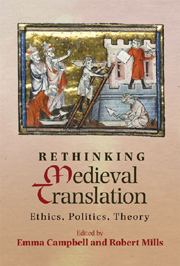Book contents
- Frontmatter
- Contents
- List of Illustrations
- List of Contributors
- Acknowledgements
- Introduction: Rethinking Medieval Translation
- 1 On Not Knowing Greek: Leonzio Pilatus's Rendition of the Iliad and the Translatio of Mediterranean Identities
- 2 Translation and Transformation in the Ovide moralisé
- 3 Translating Lucretia: Word, Image and ‘Ethical Non-Indifference’ in Simon de Hesdin's Translation of Valerius Maximus's Facta et dicta memorabilia
- 4 Translating Catharsis: Aristotle and Averroës, the Scholastics and the Basochiens
- 5 The Ethics of Translatio in Rutebeuf's Miracle de Théophile
- 6 Invisible Translation, Language Difference and the Scandal of Becket's Mother
- 7 Medieval Fixers: Politics of Interpreting in Western Historiography
- 8 The Task of the Dérimeur: Benjamin and Translation into Prose in Fifteenth-Century French Literature
- 9 The Translator as Interpretant: Passing in/on the Work of Ramon Llull
- 10 Rough Translation: Charles d'Orléans, Lydgate and Hoccleve
- 11 Bueve d'Hantone/Bovo d'Antona: Exile, Translation and the History of the Chanson de geste
- Untranslatable: A Response
- Bibliography
- Index
8 - The Task of the Dérimeur: Benjamin and Translation into Prose in Fifteenth-Century French Literature
Published online by Cambridge University Press: 05 April 2013
- Frontmatter
- Contents
- List of Illustrations
- List of Contributors
- Acknowledgements
- Introduction: Rethinking Medieval Translation
- 1 On Not Knowing Greek: Leonzio Pilatus's Rendition of the Iliad and the Translatio of Mediterranean Identities
- 2 Translation and Transformation in the Ovide moralisé
- 3 Translating Lucretia: Word, Image and ‘Ethical Non-Indifference’ in Simon de Hesdin's Translation of Valerius Maximus's Facta et dicta memorabilia
- 4 Translating Catharsis: Aristotle and Averroës, the Scholastics and the Basochiens
- 5 The Ethics of Translatio in Rutebeuf's Miracle de Théophile
- 6 Invisible Translation, Language Difference and the Scandal of Becket's Mother
- 7 Medieval Fixers: Politics of Interpreting in Western Historiography
- 8 The Task of the Dérimeur: Benjamin and Translation into Prose in Fifteenth-Century French Literature
- 9 The Translator as Interpretant: Passing in/on the Work of Ramon Llull
- 10 Rough Translation: Charles d'Orléans, Lydgate and Hoccleve
- 11 Bueve d'Hantone/Bovo d'Antona: Exile, Translation and the History of the Chanson de geste
- Untranslatable: A Response
- Bibliography
- Index
Summary
This chapter proposes a rapprochement between Walter Benjamin's ‘The Task of the Translator’ (1921) and fifteenth-century works that claim to be translating older French verse into prose. Benjamin's essay is famous, its meaning obscure. As Paul de Man claimed, it ‘is very well known, both in the sense that it is very widely circulated, and in the sense that in the profession you are nobody unless you have said something about this text’. Contrastingly, the late medieval French prosifications have attracted little critical attention; being considered largely self-explanatory, even banal in their moralizing content and legitimizing programme, they have been read primarily as documents in the history of culture. However, Benjamin's work suggests new ways of thinking about the prosifications as translations, while the fifteenth-century material throws light on contentious aspects of Benjamin's essay. In the context of the present volume, my interest is less in the ethics of translation than in its historical and political dimensions. Specifying the particular notions of history and of politics with which I am concerned will be a major task of this chapter.
To begin with the medieval: from the thirteenth century onwards, there arose differing trends for producing lengthy narrative works in French prose. I am concerned here with a trend of the mid- to late fifteenth century, when these prose vernacular works were variously sponsored: by the dukes of Burgundy especially, but also by other branches of the French royal family, by noble families and by towns or regions.
- Type
- Chapter
- Information
- Rethinking Medieval TranslationEthics, Politics, Theory, pp. 164 - 183Publisher: Boydell & BrewerPrint publication year: 2012



